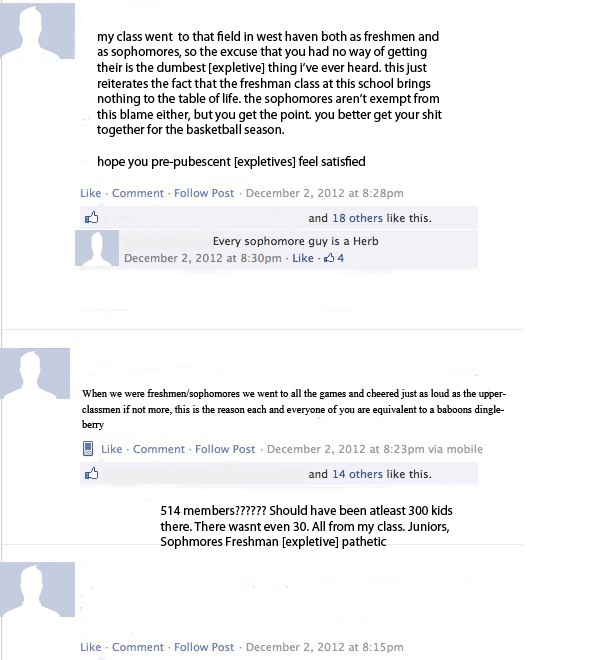They’re the 12th athlete on the football gridiron, the 10th player on the baseball diamond, and the 6th man on the basketball court.
They don’t attend Staples, they cannot be found cheering on their high school peers from the student section, and they are not considered SuperFans. Instead, they’re SuperFams.
She’s the mom whose voice is the soundtrack to her daughter’s soccer years; he’s the dad who got yellow carded by the football referee during his son’s PAL glory days. They’re the all-too-common family members who sometimes get more into the game than the players do themselves.
“There’s a saying in coaching: ‘The best team to coach is a team of orphans,’” said Staples boys’ soccer coach Dan Woog. “While I would not go that far—we have, by and large, a great set of parents—there are certainly instances where I wished a few parents would have pressing business in Asia from late August through mid-November.”
In his 30 years of coaching, Woog has noticed a differing set of characteristics between parents who are overzealous and parents who are able to keep their cool both in the stands and face-to-face with Woog.
According to Woog, parents being too involved in their children’s sports can be indicative of troubles elsewhere in their lives. “Maybe [the parents] were a less-than-successful athlete; maybe something is going on at work; maybe they’re having a tough time controlling their son at home,” said Woog. “Whatever the reason, they feel that sports is one area they should be able to control.”
Woog elaborated that the level of expertise that some parents believe they have attained from “watching their son’s games for years” reflects the fact that they have only been watching the play of their son, and as a result, don’t consider what is best for the team.
“They are not experts on soccer, they are experts on their son,” he said.
Yet Staples is an athletically successful community, in large part because of the parents. Parents are the way young athletes get to practice, hone their skills on club teams in the off-season, foot the bill so they can be equipped with all the right gear, and, at the high school level, guarantee their kids with the important components of pre-game bagels, sandwiches and pasta dinners.
As Woog prefaced, many Staples parents are not part of this aforementioned group of overzealous parents, but rather provide the foundation for Staples’ successful athletic departments within both the FCIAC and the CIAC. Coach Heather Driscoll can attest to these positive parents, as she withstood her first season with girls’ varsity soccer without any “major negative correspondents.”
Driscoll, who has had coaching experience in both the club and collegiate level, has learned over the years just how difficult it can be to keep everyone happy.
“I think there are always times when parents don’t agree with what the coaches say, and I’ve had some parents express their opinions,” Driscoll said.
Yet Driscoll has yet to encounter an “opinionated parent” during her experiences with the popularly nicknamed “gsocc” team.
“At Staples, we have a lot of SuperFans for parents, in terms of attending all the games and being really supportive of their daughters and the whole team. Certainly, none of it is in a negative way,” Driscoll said.
From a coaching standpoint, Driscoll believes being a positive “role model” for the athletes is the most important position a parent can play. “The perfect parent fan is someone who is there to support and cheer on not only their daughter, but the entire team, no matter what’s taking place in the game….Even if the team is struggling, the parents should be supportive and positive.”
Yet Driscoll’s ideal parent fan is one who does not just support the team, but supports the coach as well. In Driscoll’s opinion, when a parent respects the coaches, it teaches the players their responsibility to do what the coach is asking of them, “whether its something they agree with or not.”
For the objects of these parents’ affections—their kids—the reaction is largely mixed. Some love the attention and see it as signs of their parents’ love, while others simply wish they would settle down.
“Everyone on my old club team knew who my mom was,” said former soccer player Johnny Denowitz ’13, adding that whenever there was a shouting parent, chances are it was his mother. “It seemed kind of normal back then because my mom wanted me to do well, but now I just think, ‘Who does that?’”
While Denowitz acknowledges that his mom simply wanted him to be the best, he admits that, based on his Staples soccer career, “It just wasn’t the case.”
Others, such as baseball player Robbie Vallone, see nothing negative in their parents’ exuberance.
“It is very motivating, and it touches my heart dearly that [my dad] cares so much about both my sporting event and my life,” Vallone said.
Courtney Barry ’13 has a similar admiration for her mother’s support of Staples’ girls volleyball. While Barry ended her season with an injury and recalls the way her mom would “come to every single game and yell obnoxiously, sometimes even at me when I was sitting on the bench,” she recognizes that her mom just likes to see athletes working hard while enjoying themselves at the same time.
“I get excited at games because I am proud of the school and the players. I know how much commitment it takes to get to that level,” said Tammy Barry, mother of Courtney. As a mother of three and an athlete herself, Barry knows how it feels to have people encouraging her. “It’s nice to have someone motivating you,” said Barry, adding that it is especially important with teams who don’t receive large fan bases on a regular basis. Barry prides herself on her ability to inspire the players and rally the team at tough moments during the game.
In the end, it comes down to the players, and Will Englehart ’14 believes high school sports should be in good fun.
“The majority of those who play a sport—hockey in my case—aren’t playing to make it to the pros, but are just playing for the fun of it,” he said. “It’s the kids’ game, and they should let it stay that way.”















































